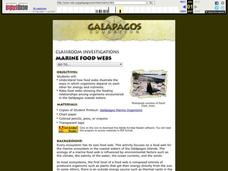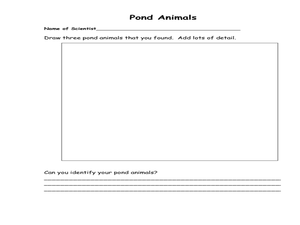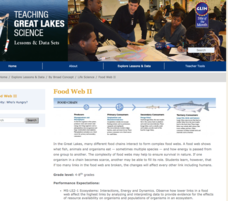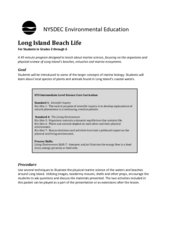Curated OER
Trail Adventure
Young scholars create a trail with numbered specimens. Students complete an accurate and functional interactive trail activity brochure. They complete a web page tree identification guide and interactive identification activity. Young...
Curated OER
Coral Reefs Endangered
Students research where in the world coral reefs are located. In this ecology instructional activity, students create food chains and food web. They simulate growing coral reefs to understand their characteristics better.
Curated OER
Toward a Sustainable Agriculture
Students examine how to use ecological analysis to animal production systems. In this sustainable agriculture lesson students examine where the nutrients flow in a system and complete several activities.
Curated OER
Marine Food Webs
Students examine how food webs illustrate the ways in which organisms depend on each other for energy and nutrients, and make food webs showing the feeding relationships among organisms encountered in the Gal??pagos coastal waters.
Curated OER
Pond and Pond Organisms
Learners explore pond ecosystems. In this pond organism activity, students will use pond water and a plastic bad in order to locate and identify freshwater organisms. The activity is designed for younger grades, but...
Curated OER
Wetlands - Food Web Relationships
In this food web relationships worksheet, students click on the links to learn about the food web relationships in the wetlands and answer short answer questions about it. Students complete 8 questions total.
Curated OER
Web of Wonder Lesson Plan
Students learn how all living things in an ecosystem are connected in some way. By building their own "web" your class look at energy flow through the food web system and how environmental changes disrupt the system.
Curated OER
Ecological Citizen
Learners examine the interconnectedness of living and non-living things that constitute an ecosystem. They examine fallen trees,insects, living trees, leaves, food webs, and forests. They conduct various activities and write poems about...
Curated OER
Introduction to Biomes
Eighth graders identify the different kinds of biomes. In this life science lesson, 8th graders explain their importance in an ecosystem. They take a BrainPop quiz at the end of the lesson..
Virginia Department of Education
The Cycles of Nature
Encourage peer collaboration and assist with the creation of visual aids to identify carbon, water, and nitrogen cycles as your class learns more about nature. They discuss relative information, create a visual aid...
Polar Trec
Bering Sea Fabulous Food Chain Game
In spring, the Bering Sea turns green due to phytoplankton, which live at the surface, experiencing a population explosion. Groups of scholars play a food chain game, writing down food chains as the game is played. After five to six...
Curated OER
Biosphere
There is so much to learn about the different cycles, processes, and parts of the biosphere. Using a pretest as a formative assessment to see what your budding ecologists already know is a great way to figure out which important areas...
Michigan Sea Grant
Food Chains and Webs
Starting with a simple food chain, young scientists interpret the difference and interrelatedness between herbivores, carnivores and producers. They answer questions related to cause and effect of food chain disruptions, including the...
Michigan Sea Grant
Food Web II
A food web consists of complex food chains and the more complex the web, the better likelihood of survival. Learners compare and contrast food webs and food chains and discuss concepts like the predator-prey and consumer-producer...
Curated OER
Ecology 5 - Carbon and Oxygen Cycles
Students construct their own diagrams outlining the pathway of carbon and oxygen in our atmosphere. They listen to a lecture on the carbon cycle while drawing an example of the carbon cycle on the board. Students comprehend that CO2 is...
Curated OER
Ecology
In this ecology instructional activity, students read information about ecology and the nine ecology subdivisions and answer comprehension questions. Students answer ten questions in this matching and fill in the blank instructional...
Curated OER
Habitat Art: Florida Panthers
Students discover the lifestyles of a Florida Panther by investigating its habitat. In this wild animal lesson, students utilize the Internet to research the habits of a Panther and what their habitat is. Students create an...
Curated OER
Habitat Basics
First graders get out and explore two different habitats to examine how each one meets the needs of the plants and animals that dwell there. They discuss what they've learned about animal habitats as they explore the outdoor environment....
Cornell University
Bacteria Take Over and Down
Bacteria outnumber all other forms of life on Earth. Scholars observe the growth of bacteria in petri dishes to understand their role in maintaining good health. Then, they observe the growth of bacteria after they introduce...
Curated OER
Water's Edge Café
Students observe water birds feeding at a local wetland, record what they see, and construct an appropriate menu for a "Waterfowl Cafe." They also play a "flocking" game.
Curated OER
Owls: Top of a Food Chain
Although written for middle schoolers, there is no reason that a 3rd, 4th, or 5th grader could not also learn about food chains through the dissection of owl pellets. After you introduce the topic, learners complete an owl research...
Columbus City Schools
Photosynthesis and Respiration
Thirty percent of the world's oxygen is produced by rainforests found throughout the world. Seventh grade learners explore the processes of photosynthesis and respiration through 10 days of labs, manipulatives, and discussions. They...
Curated OER
Long Island Beach Life
Have your class learn about marine life through this resource. This comprehensive lesson has learners discuss marine life, learn key vocabulary, discuss environmental concerns, and play games related to migration and predator/prey...
Other popular searches
- Energy Flow in Ecosystems
- Energy Flow Through Ecosystems
- Energy Flow Ecosystems
- Flow of Energy in Ecosystems

























